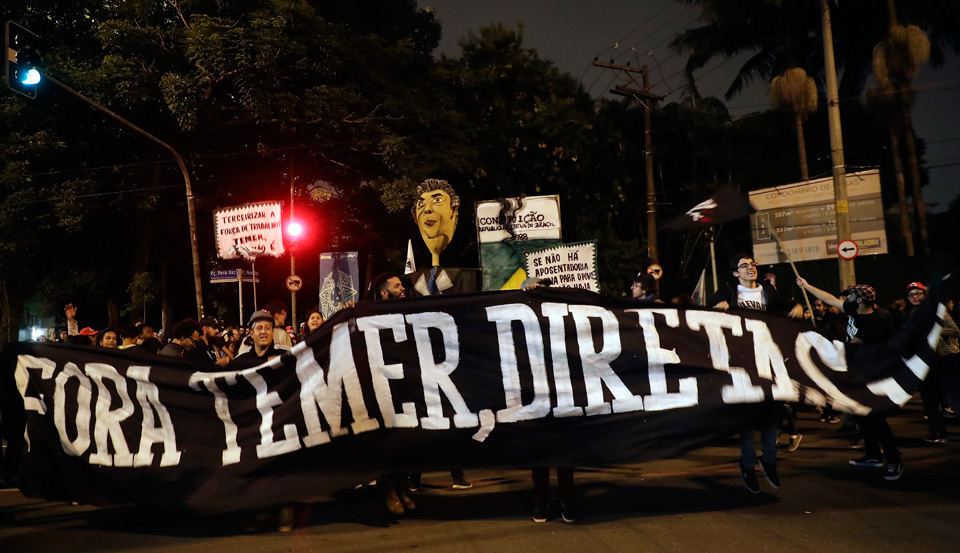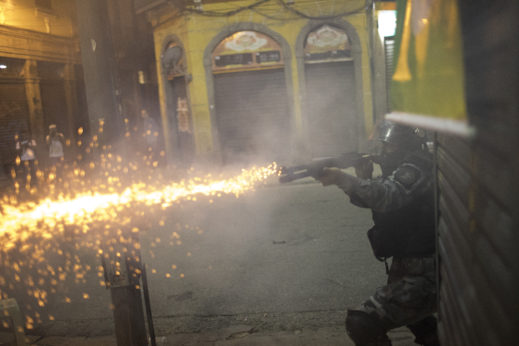
RIO DE JANEIRO, Brazil – According to labor union sources, 35 million people participated in a general strike and massive protests across Brazil on Friday, April 28. The strike was called to oppose labor reforms being put forward by President Michel Temer – specifically against a measure known as Proposed Constitutional Ammended number 287 (PEC in Portuguese which Temer has submitted to Brazil’s lower house, the Chamber of Deputies.
Across the country, the protests were met with police repression, with especially harsh repression coming in Rio de Janeiro.
Temer is considered by millions of Brazilians to be an illegitimate president because he was not elected by a popular vote, but instead assumed his position after a coup d’etat that removed former President Dilma Rousseff. His illegitimacy further undermines the reforms he is attempting to push through the legislature.
At present, a man can solicit his pension when he is 70 years old, and a woman at 65, if they have contribuited to the pension fund for 15 years. Temer’s PEC 287 increases the minimum time of contribition of workers from 15 to 25 years, and the minimum age to receive a pension would rise to 75 years.
Temer’s supposed pretext for the measures is that they are necessary to save the social security fund from sinking into deficit. But rather than being due to retirees, economists say the deficit is caused by companies that owe billions in back contributions to the social security fund.
In Rio de Janeiro, police moved against a workers’ demonstration in front the building of the city’s Assembly of Deputies and the Municipal Theater. On the night of April 28, security forces threw tear gas bombs at the demonstrators and shot at them with rubber bullets.
The police actions ignited a fire inside the theater,where 22 tear gas canisters and three rubber bullets were later found. During the police attack against the striking workers, Deputy Glauber Braga of the Socialism and Freedom Party (PSOL) was hit by a rubber bullet while announcing the end of the demonstration on a stage in front the Assembly of Deputies.
Juliana Krapp, a journalist with the FioCruz Scientific Foundation, wrote in a Facebook post: “No, the blame for the absurd belligerence and violence that dipersed the demonstration in the center of Rio on the afternoon of April 28 wasn’t that of ‘vandals’.”
Contrary to mainstream press accounts of the day’s events, she said that demonstrators had not been violent but rather were targeted by police “in a cowardly manner.” The demonstration, according to Krapp, had been peaceful, but police encircled protesters and launched tear gas in all directions. She said that even after the protest had broken up and people dispersed, police forces continued to pursue them into different neighborhoods.
In São Paulo, 100,000 people protested in Largo da Batata, marching to a house belonging to Temer. Most public transit – subways, buses, and trains – did not run. The roads were also blocked. The national president of the Central dos Trabalhadores do Brasil (CTB), the country’s main trade union federation, said in a statement: “Organized civil society, the working class, joined in the movement to say no to the program of labor deregulation and to the pension reform. Only the united people will can turn this nation into a more just country.”
The prefect of São Paulo City, Jorge Doria of the centrist Brazilian Social Democracy Party (PSDB) called the strikers “vagabonds” and “bums.” He supports the Temer government Temer and its anti-worker reforms.

In Porto Seguro, Bahia State, thousands of people marched from the bus station to the social security building chanting, “Temer out,” and “If the reform is not stopped, Brazil will stop.” The demonstrating workers marched to close the restaurants and stores with a chorus of “Close up!” and “Come out into the street!”, calling on workers who were not participating in the movement to join it. In Porto Seguro, as in all of Brazil, students, teachers, rural workers, and all categories of workers participated in the strike, The protests paralyzed traffic on most streets and roads, closing the principal entrances and exits of the city.
In Brasília, the national capital, subway and road workers began a general strike, but the Attorney General’s Office (AGU) prevented the total paralysis of the city, by ordering 30 percent of transport workers to remain on the job. Here, as in other cities, security measures were exercised against the strikers.
Temer, whose policies are rejected by 92 percent of Brazilians according to public opinion polls, decided to dismiss 22 government employees who oppose his reforms. Organized labor, however, continues the struggle against his proposed reforms. Further strikes and protests are expected under the slogan,“Temer Out!”
Lucivânia Nascimento dos Santos is a master’s degree student in the State and Society program at UFSB – Universidade Federal do Sul da Bahia (The Federal University of the South in Bahia, Brazil).












Comments